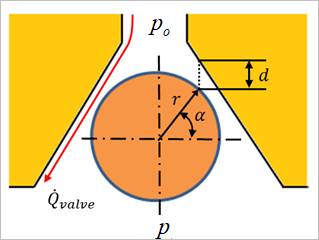
According as the check ball moves between the plunger and cylinder by the plunger spring, the check valve opens or closes, and the oil flows.
When the check valve opens, the oil flow through the check valve is shown in Figure 1.

Figure 1 The oil flow rate through check valve
As the resistance of the oil through the check valve depends on the orifice area in this investigation, the dynamic resistance is considered for the turbulent flow of the oil flow through the check valve, which yields,

where,
• is the supply pressure
is the supply pressure
• is the chamber pressure.
is the chamber pressure.
(If  is less than
is less than  , there is no oil flow through check
valve.)
, there is no oil flow through check
valve.)
• is the discharge coefficient of
check valve
is the discharge coefficient of
check valve
• is the orifice area
is the orifice area
• is the density of oil
is the density of oil
 represents the oil stream
flowing rate through the opened check valve into the pressure chamber. The area
of orifice can be obtained such as
represents the oil stream
flowing rate through the opened check valve into the pressure chamber. The area
of orifice can be obtained such as
